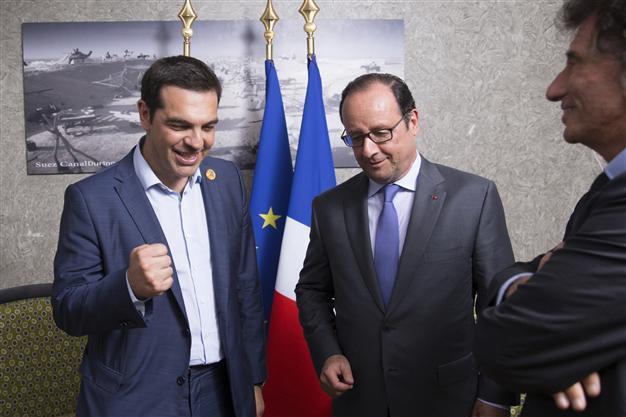EU officials to review progress in Greek bailout talks
BRUSSELS - Reuters

AP photo
Senior EU officials will confer by telephone late on Aug. 7 on progress in negotiations between Greece and its international creditors on a third bailout for the near-bankrupt euro zone country with Germany reported to be warning against haste.Greek Prime Minister Alexis Tsipras is trying to force the pace of the talks, keen to wrap up agreement on sensitive economic reforms by mid-August, while many Greeks are on holiday, and receive an initial aid disbursement by Aug. 20 in time to make a bond payment to the European Central Bank.
Athens is negotiating with European Union institutions and the International Monetary Fund for up to 86 billion euros ($94 billion) in fresh loans to stave off economic collapse and stay in the euro zone.
At a meeting in Egypt on Thursday on the sidelines of ceremonies for the inauguration of a Suez Canal extension, Tsipras and French President Francois Hollande agreed that a new deal should be concluded soon after Aug. 15.
"The objective is for the negotiations on the programme ... to be concluded at the end of August. We know it's difficult but we must make sure that the conditions are met, in a good spirit," Hollande told reporters.
Talks were going "in the best of directions", he added.
The European Commission too says talks are moving "in a satisfactory way" and is keen to wrap them up soon, not least because of the political sensitivity of arranging another bridge loan for Athens if a deal is not ready in time.
Commission spokeswoman Mina Andreeva said she did not expect "any particular decisions" from Friday night's meeting although negotiations had begun on drafting a memorandum of understanding on a loan agreement.
Germany, keen on fiscal discipline and far-reaching economic reforms, is sceptical of any early deal and doubts a multi-billion euro bailout can be agreed by mid-August.
"It remains completely open," said one politician from the ruling coalition government, adding that Finance Minister Wolfgang Schaeuble was taking a cautious view of comments by Commission chief Jean-Claude Juncker on the chances of a deal.
Greece would not get a free ticket to new aid, the coalition politician added.
The Sueddeutsche Zeitung said the German Finance Ministry favoured another bridge loan to give Greece and its creditors time to negotiate a comprehensive reform programme.
A ministry spokeswoman told a news briefing on Wednesday: "According to our information, a range of issues remain to be settled, especially around future conditionality."
Open questions included macroeconomic and budget targets which required calm and thorough discussion, she said.
That appeared to reflect Finance Minister Wolfgang Schaeuble's scepticism about whether Greece is fit to remain a member of the 19-nation European monetary union.
Schaeuble last month proposed that Athens take a "time out" of up to five years from the euro if it could not meet the conditions, an idea seen as a veiled expulsion from the common currency.
He was overruled by Chancellor Angela Merkel, who negotiated a July 13 euro summit deal under which Tsipras accepted tougher terms than those he had previously rejected in return for talks on a three-year loan to keep it in the euro zone.
All sides agree the negotiations that began at expert level on July 20 have gone smoothly in terms of procedure, with none of the obstruction and squabbles over protocol and access to data and ministries that marked previous rounds under Tsipras' leftist Syriza party.
There have been few leaks on the substance - partly because many officials are on holiday but also perhaps a sign of serious intent on both sides.
Greece reported progress this week on pension reform, a sticking point in the past, but other sensitive issues include taxation of farmers, labour law, liberalising product markets and cutting defence spending. On the creditors' side, the most sensitive issue is debt restructuring to ease Athens' burden.
EU sources said Friday evening's conference call of the Economic and Financial Committee of deputy finance ministers of all 28 EU member states would be briefed on the state of play and, if talks were really far advanced, might prepare the way for a teleconference of euro zone finance ministers next week.
If more issues remain open, they could discuss conditions for a second bridging loan of up to 5 billion euros to enable Athens to meet the ECB bond redemption deadline, they said.
Greece has said it doesn't want more bridge finance, and non-euro EU countries such as Britain and the Czech Republic are not keen to add to last month's loan from the European Financial Stability Mechanism.
However, new rules were formally enacted this week to ensure the contributions of non-euro states would be guaranteed by euro zone funds in case such a loan were required.
One senior euro zone official who will be on Friday's call said advances so far in the negotiations suggest an agreement should be ready just before Aug. 20, but an EFSM loan might be available as a backup if it takes a little longer.
















